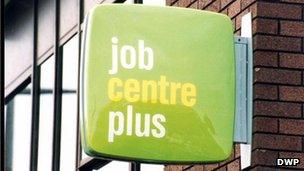PCS union picks Budget Day for start of strike
- Published

PCS members include Jobcentre, benefits and tax office workers
The UK's largest civil service union, the Public and Commercial Services Union (PCS), has picked Budget Day - 20 March - to start its industrial action over pay and pensions.
The day will be the first in a series of protests which are scheduled to last three months.
The PCS's members, who include customs, immigration, benefits and Jobcentre staff, want a 5% pay rise, or £1,200.
The union says 61% of those who voted in a national ballot opted to strike.
Turnout among the union's 250,000 members balloted was 28%.
Of those who voted, 80% were also in favour of forms of industrial action other than striking.
A union spokesman said categories of workers involved in the action included staff in jobcentres and benefits and tax offices; UK Border Agency and customs staff at borders; passport agency employees; admin and training staff in prisons; driving examiners, coastguards, and staff at the DVLA; staff at some museums and galleries; and Police Community Support Officers.
The general secretary of the PCS, Mark Serwotka, said: "Civil and public servants are working harder than ever to provide the services we all rely on but, instead of rewarding them, the government is imposing cuts to their pay, raiding their pensions and trying to rip up their basic working conditions.
"There is an alternative to cutting the living standards of hard-working public servants and our campaign is designed to make the case loud and clear."
A spokesman for the Cabinet Office said: "It is disappointing that, yet again, the PCS insist on pushing for futile action which benefits no-one, and damages the services they deliver to the public.
"The government took the tough decision to freeze public sector pay for two years, while protecting those earning under £21,000 by increasing their pay by at least £250 per year. Pay restraint has helped to protect jobs in the public sector and support high-quality public services."
- Published4 March 2013
- Published28 February 2013